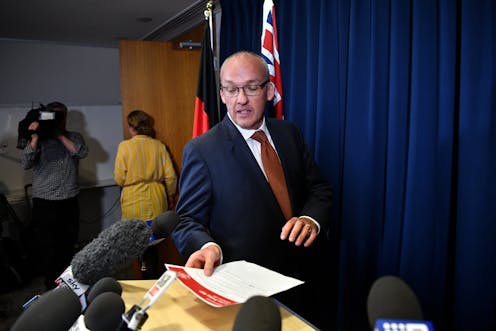Luke Foley's resignation is a disaster for Labor but may not bolster Berejiklian much either
- Written by Michael Hogan, Associate Professor and Honorary Associate, Department of Government and International Relations, University of Sydney

The resignation of Luke Foley as Labor opposition leader in New South Wales is a disaster for the party as it faces a March 23 general election - but it isn’t necessarily great news for the ailing Berejiklian government either.
To form a judgement about the impact of Foley’s resignation on Labor’s electoral chances, just take a look at the state of play about a month ago.
First, we need to look at how the government and opposition were travelling before Corrections Minister David Elliott accused Foley of sexual misconduct under parliamentary privilege on October 18, effectively setting off Labor’s leadership crisis.
Virtually all media attention was on the performance of the Berejiklian government and on the premier herself. Foley was little known and little regarded. However, he was steering the ship with some skill, albeit with occasional problems.
It says a great deal about the low political esteem in which the government was held that, even without a popular opposition leader, the Coalition was seen to be in electoral difficulty. Not that a wager on a Labor victory would have been a safe bet back then, either. Still, the Coalition was likely to lose seats and quite likely to lose majority status in parliament at the upcoming elections.
Nothing has changed on that side of politics. Berejiklian still faces discontent about her hasty policy decisions and frequent backtracking; uncompleted grand projects like the new tram network and WestConnex remain problems rather than achievements.
Read more: Privatising WestConnex is the biggest waste of public funds for corporate gain in Australian history
Add to that the difficulties over electoral support for the Coalition – especially for the National Party in regional New South Wales, and there is a flow-on from the disastrous performance of both Coalition parties at the federal level.
The unhappy picture only gets worse with the prospect of factional warfare in the Liberal Party as conservatives, led by Tony Abbott, attempt to take control of pre-selections and the state party machinery in the next few months.
Maybe the present crisis in the Labor Party will also have a negative effect on the Coalition, since David Elliott’s intervention smacks of the worst kind of “bear pit” politics that brings party politics into disrepute.
A mea culpa from Foley might have helped
Still, the Foley resignation is a disaster for the prospects of the Labor Party. Perhaps a quick transfer of power to a new leader, and apologies all round, might have left the party with a chance of winning the election. But Foley’s stated determination to fight the accusation with defamation proceedings makes the situation worse.
Foley can hope to remedy his plight only if he can prove that the allegations against him are false. As the likely new leader of the party, deputy leader Michael Daley, has pointed out, it is not politically (or ethically) acceptable for a political leader to blame his alleged victim.
Daley is also the shadow planning minister, and served as a former roads and police minister before Labor lost government. After Foley stood down, Daley quickly emerged as the most likely successor.
He was Foley’s main rival in the wake of the resignation of former Labor leader John Robertson in 2014.
Foley’s likely successor urges Foley to leave parliament
Daley, quite sensibly, has said that Foley should consider his position, and resign from parliament, and presumably drop his plan to sue for defamation. Foley has since said he will not re-contest his seat in the March 2019 election.
Presuming that Daley is the new leader, he will have little time to assert his authority and impress the electorate. He has ministerial experience, but that was in the disastrous last Labor administration, which was thrown out of office for the corruption that resulted in two of his ministerial colleagues going to prison.
His reputation in the party is of experience and competence, but he can expect to be reminded of his friends and colleagues, Eddie Obeid and Ian Macdonald. That is a lot of baggage to carry.
Authors: Michael Hogan, Associate Professor and Honorary Associate, Department of Government and International Relations, University of Sydney





